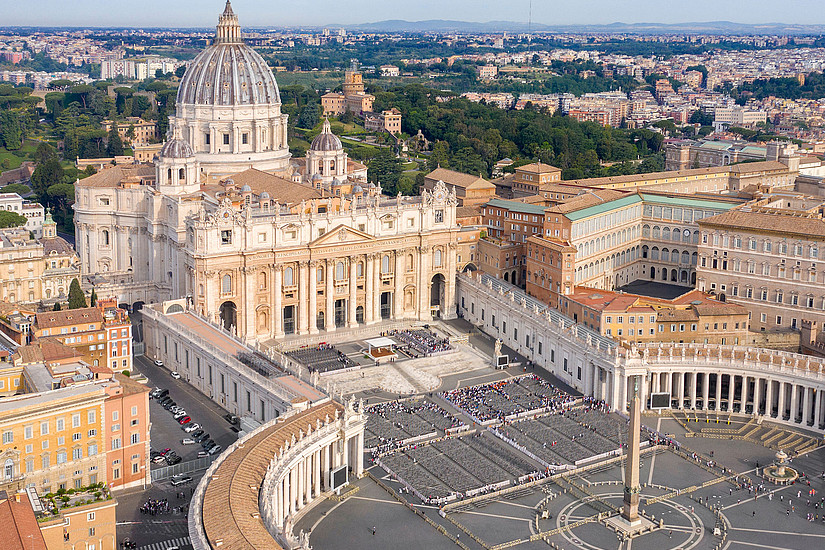Pope Francis died on April, 21st, 2025 in Rome at the age of 88. Born and raised in Argentina, he has been the first non-European head of the Roman Catholic Church in centuries, a position he has held since 2013. Jorge Mario Bergoglio, as the descendant of Italian immigrants was originally named, was well liked by many people. He was known for his solidarity with the poor and the excluded, his – albeit very cautious – steps towards greater openness, for example with regard to the role of women in the church or same-sex couples, for interreligious dialogue and his concern for our planet in the face of climate change.
Just recently, Pope Francis condemned Trump's mass deportations of migrants in a letter to US bishops. He was a Christian who lived the message of Jesus, love for one's neighbour, showed it publicly and also demanded it from others. "His first trip in office was to the island of Lampedusa off Sicily in 2013 to draw attention to the fate of boat refugees," recalls Pablo Argárate, church historian at the Faculty of Catholic Theology at the University of Graz. The Argentine is not only a fellow countryman of the Pope, but has also studied his life in great detail. "In the 1970s, during the military dictatorship, Bergoglio was the provincial in charge of the Argentine province of the Jesuit order, which he ran in a very authoritarian way," says Argárate.
For the poor
After a study visit to Germany and his return to Argentina in the early 1990s, he changed a lot, says the theologian: "From then on, he turned to people on the margins of society with great earnest and gained great popularity." As Auxiliary Bishop and later Archbishop of Buenos Aires, and from 2001 as Cardinal, he always focused on the poor. "In 2013, shortly before his election as successor to Pope Benedict XVI, he gave a short speech in which he emphasised that the church must go out to the people instead of waiting for them to come," says Argárate. He inspired people with his friendly, natural manner and his simple language. "That made him a media star," says the church historian.
In line with the Second Vatican Council, Pope Francis wanted his church to be a pastoral church, explains theologian Martina Bär from the Department for Systematic Theology and Liturgical Studies. “By that, he meant a church that responds to the option for people, especially the marginalised in our societies,” says Bär. “During my research trips, I was repeatedly confronted with the accusation that the Catholic Church talks a good game when it comes to helping the poor, but does little of substance. Pope Francis was a pope who wanted to change that.”
For Pope Francis, reaching out to people, whether in or outside the Church, also meant seeking dialogue with other religions. In 2019, he became the first Pope to travel to the Arab world. In Abu Dhabi, he signed the "Document on Human Fraternity for a Peaceful Coexistence in the World" with Sheikh Ahmed el-Tayeb, a leading representative of Sunni Islam.
A church for everyone
Along with his concern for the poor, Pope Francis' criticism of unregulated capitalism and economic liberalism "led to him being accused of being a communist in Eastern Europe and the United States, among other places; in addition to criticism of his reforms, which were too far-reaching from the point of view of conservative circles," says Argárate. Although the Pope remained loyal to the Church's previous position on celibacy and the priesthood of women, at the same time he sent a clear signal of openness to modern social developments, for example by allowing same-sex couples to be blessed and appointing women to important positions. "In January of this year, he appointed Sister Simona Brambilla as Prefect of the Dicastery for Institutes of Consecrated Life and Societies of Apostolic Life. This is the first time that a woman has headed an authority in the Vatican. On 1 March 2025, Sister Raffaella Petrini will become the first woman to head the entire Vatican administration," adds Argárate.
Some critics say these steps don't go far enough, explains theologian Bär. “At the World Synod, many women's voices were calling for more participation. Above all, the continued lack of admission to the office of deacon is an open flank in the women's issue.” Theologian Argárate sees the reluctance on this point as rooted in concerns about the unity of the church: "It has always been very important to Francis that everyone can find themselves in it, that there is no division." The Pope strengthened the Church as an international community by appointing a particularly large number of cardinals from emerging countries and the Global South, thus giving them more weight, a greater say and more appreciation.
The Earth as a gift from God
In his first social encyclical, Laudato si, in 2015, Pope Francis placed a strong emphasis on ecology, on our planet, which needs to be protected. In doing so, he reached a large audience, far beyond the church community. "The document is considered an important contribution to the global sustainability discourse," says Thomas Gremsl from the Institute for Ethics and Social Theory at the University of Graz. On this topic, too, Pope Francis once again commented on current challenges that people and societies have to face in the here and now with a view to the future.




